- Home
- Belva Plain
After the Fire Page 3
After the Fire Read online
Page 3
“On Gerald, you mean.” Now anger rushed back. “You might as well know that I heard everything you said last night.”
“Oh, Hy, you promised!” Dad cried, putting the cup down so forcefully that coffee slopped onto the table.
“I'm sorry you did,” Francine said. “I'm truly sorry. But I can't help what I feel. I'm not telling you never to see Gerald. I'm only afraid you will get too deeply involved. I may be all wrong, but I don't think so.”
There went the worry lines on her forehead again. They were absurd, theatrical and absurd.
“I already am deeply involved,” Hy said.
And now their eyes joined in a long significant look. Each was recalling an afternoon's encounter no more than a month ago.
“I have to ask you, Hyacinth,” Francine had said then. “You'll say you're twenty-one and it's your life, which is true, yet parents don't lose interest simply because a person is an adult. But are you sleeping with him?”
This had been the ultimate humiliation. “Not yet,” she had lied, and enjoying the freedom to taunt a bit, however politely, she had added, “Not yet, although he wants to.”
“Of course he does! And of course you are! Just don't let him play with you! You may be twenty-one, but you don't know everything. Sex isn't a game.”
Hyacinth said fiercely now, “This talk is all about your hating Gerald, Francine. That's all it is. I can't believe the things you've said. It isn't like you to be so unkind.”
“I never said I hated him. You are so stubborn, Hyacinth!”
“Dad's already told me that once today.”
Francine glared at Hy. “Well, you are.”
“Weren't you stubborn when you were in love with Dad?”
“There is no comparison, Hyacinth. None at all. We knew each other well. Our families knew each other. We were part of the same community. There was nothing sudden about the affair.”
Hy kept looking at those tiny vertical lines between her mother's delicate eyebrows; they were the only lines to mar her perfect skin. Skin like milk, Dad always said.
She's always so sure she's right, Hy thought, replying quietly, “It's not the suddenness that you mind. It's that Gerald's not ‘part of the community.’ It's that he lives alone in a room in Linden.”
Francine gasped. “Is that your opinion of me? If it is, you should be ashamed. Are you hearing this, Jim?”
“I am. Yes, that was unfair, Hyacinth. The last thing anyone could accuse your mother of being is a money snob.”
Well, probably it was unfair and untrue. And yet the things she had said about Gerald and this house—
She apologized. “I'm sorry. I shouldn't have said it. I'll only say that for some reason or other, you don't like him. And that is totally, unforgivably mean of you.”
For a mother and daughter, they were too often at odds with each other. Now they were at an impasse.
Once again it was Dad who broke through the tension. “You're both letting your emotions run away with you, and that's a great pity because you are both reasoning people, and you love each other. So here's what you do. Both of you, drop the subject. Right now. I don't want to hear it again, and I mean that. None of us really know the young man all that well to have any worthwhile opinion. You may tell him, Hyacinth, that we would like to see more of him. If he's sincere, he'll welcome the invitation. And now let's finish this pie in peace.”
CHAPTER THREE
Thirty miles one way to see an art movie,” Francine asked. “Is it worth it in such weather?”
The objection was pleasantly spoken, and coming as it did after two or more weeks of calm, it was pleasantly received.
“It's only rain.”
“Look out of the window.”
A violent wind racked the trees, whipped the lowest branches far enough to graze the ground, and snapped them back.
“It's the last day,” Hy said, “so it's our only chance to see this picture. It's supposed to be marvelous.”
“You have to drive so far out of your way to pick him up in Linden.”
“Because I'm the one with the good car. We can't depend on his. Don't worry about me. It's not as if they're expecting a blizzard. We'll take our time getting there, have something to eat after the matinee, and be home a little late.”
On the screen, a pair of lovers stood watching a sailboat approach the curve of a blue-green bay on the Tyrrhenian Sea. They were standing close, hand in hand. A breeze blew the girl's cotton skirt above her bare knees.
Gerald pressed Hy's hand. “Let's get out of here. We don't need to wait for the end, do we?”
“It's so beautiful,” she whispered. “I like to see the fade-out.”
“You can imagine it. I'll give you a better fade-out. Trust me.”
The Highway Motel stood between an abandoned warehouse and a vacant lot littered with rusty machinery. A large sign, conspicuously placed and now brightly lit in the waning afternoon, advertised rooms with television and video. They had been here so often that Hyacinth was sure the desk clerk must recognize them.
Gerald shuddered. “Disgusting, dirty place. God knows I should be used to them. I've lived in one long enough.”
“It's not really so dirty.”
“There goes my Hyacinth, looking at the bright side.”
“Why not? I've brought a nice quilt from home. It's in the trunk, wrapped up so nobody'll know what it is, although it's none of their business if they do.”
Gerald chuckled. “You think of everything.”
“I think of you. I think of you all day.”
They went inside. She had no idea what name he had written in the book and did not ask. That, too, was nobody's business. When they closed their door and locked it, she undressed the bed, laid the quilt upon it, and began to undress herself.
“Feel my heart. Feel how it's thudding,” she said.
“To look at you, such a refined young person, so ambitious and so serious, no one would ever guess what else you are. I know I didn't guess it.”
“So why did you come to the museum that day looking for me?”
“I don't know. Why does a man seek out a woman? You interested me very much.”
“Wasn't it love at first sight? Don't laugh. It happens, and not only in fairy tales, either.”
“All right. Call it love at first sight. Oh, come here. Get under this quilt with me.”
After their brief sleep and the familiar peace that follows completion, they lay watching the rain slanting across the gray window.
“How it rained the day we met,” Hy murmured.
His neck was soft to her lips. She wanted to lie like this, never to move, to be here for all time, to be one with him forever. A tremulous swell of emotion filled her breast; a gladness and a tenderness that she had never known before. She felt her heart's strong rhythm.
In the hall, loud voices rang and a door was rudely slammed.
“What a dump this is,” Gerald complained.
“I don't mind it. We're both here. Isn't that enough?”
“No. We deserve better.”
A vague sadness was thickening her throat with the lump that precedes tears. From somewhere came the memory of a saying: After coitus, man is sad. Why should that be? Is it fear that the rapture will never come again? The sensation that we have when we hear immortal music? Is it the feel of a June day, flawless and once gone, gone forever? Or the fear that he does not love her as she loves him? She clung so tightly to him that he felt her wet eyelids on his shoulder.
“I don't know….”
“I was only teasing before, when I pretended not to believe in love at first sight,” he said.
“Tell me what you love about me.”
“I love your grave charm, your spirit, your talent, your voice, your hot blood, everything. Hyacinth, darling, you worry too much.”
She said unexpectedly, even surprising herself, “We must be completely honest with each other, you know.”
“Well, aren't we?
I don't understand.”
“Sometimes I've hesitated to say—some things are not easy to say…. My parents would like to know you better…. We are seeing so much of each other.”
In the semidarkness on the bed, his smile was invisible, but she heard it in his voice. And she sat up, turned on the light, and looked at him anxiously.
“You're not angry?”
“No, no, of course not. They're only behaving like parents. Parents of daughters.”
“Dad thinks it's great that you're going to be a doctor. As a chemist, a scientist, he appreciates doctors. And he really likes you besides.”
“I know he does. And I know your mother doesn't.”
Hyacinth felt the prickle of heat in her cheeks. “Oh, she—actually, we haven't discussed you. To begin with, she's not as talkative as Dad is, so she and I—I don't mean that she and I don't get along, but what I'm trying to say is that she can be very positive, and I'm rather stubborn. I know I am, so I sometimes avoid getting into discussions—”
She had digressed from the subject. She was inexcusably clumsy, and she stopped just as Gerald put his hand up to stop her.
“What you are trying to tell me, very tactfully, is that I should not be hurt when I don't get a hearty welcome from her. I understand. But I've known almost from the very first that she does not approve of me.”
“I had no idea. I never thought—”
“You said we should be honest with each other, didn't you?”
“Yes, but—what happened? What did she say?”
“She didn't say anything. She has an expressive face, and I read people rather well. A doctor should.”
“I'm sorry. Oh darling, I'm sorry! She just doesn't know you, that's all it is. She'll be the first to admit she's wrong. She's very fair that way.”
“If you'll tell me what she objects to, I can try to change it.”
How could she tell him what Francine had really said? Not able to look him in the face, she made a halfhearted attempt. “She thinks you will not stay with me, that I should not depend upon you.”
“But of course that's crazy. I shall simply have to disprove her.”
“You're sure you aren't angry?”
“I'm sure.”
The whole business, this ugly suspicion, was a humiliation for both of them. She had been reckless to bring the subject up at all. And now, from head to foot, her body burned with the shame of it.
“Don't look so miserable, Hy. Come here and see yourself.”
In the bathroom before the full-length mirror, they stood naked together.
“You're spoiling your pretty face with that frown.”
“Is it really pretty?”
“You know very well it is.”
Straight shoulder-length chestnut hair fell alongside a nicely symmetrical face with grave eyes and high cheekbones below a broad, smooth forehead.
“You could be really lovely with more makeup,” Francine often said. “There's nothing wrong with you except that you look too quiet.”
“Your face shows character,” Granny said, refuting Francine. “You don't need to put a lot of stuff on it,” meaning obviously that Francine used too much “stuff.”
This amusing recollection now caused Hyacinth to smile. She thought then how odd it was that her self-confidence should vacillate so easily between its highs and its lows. Though maybe everyone's did, and they simply didn't talk about it or even admit it to themselves?
“Do stand up straight,” Francine had said. “Tall women like you can fall into the habit of slumping. You must watch out for round shoulders, especially when you're with a man who's not tall enough for you.”
There was surely no need to worry about that with Gerald. Here he stood, this miracle of a man who turned people's heads, and he was all hers.
“You're trembling,” he said. “Let's get some clothes on. It's freezing in here. And it's late, almost midnight. We'd better start. And don't worry about anything, certainly not about your mother and me. Just smile and leave it to me. She will approve of me, I guarantee it, and sooner than you think. She might even learn to love me.”
CHAPTER FOUR
The fire crackled and snapped. It glossed the brass fender and flickered over the rosy Persian carpet. Gerald stretched and sighed. “Bliss. Perfect bliss. Falling snow outside, peace and beauty inside.”
Hyacinth was seeing the room with his eyes: the books, the crystal horses on the mantel, and Francine's flourishing potted gardenia in the window bay. With his memory, she was also seeing his room, which she had once visited: a dim box filled with the noises of house and street, rank with the smell of frying grease, crowded, cramped, and lonely.
In a sense during these last months, they had entered each other's lives. They had come to know each other in ways beyond sexual love, in ways that no amount of sexual love by itself could ever provide. It seemed to her that she was feeling an increased tenderness in Gerald, a thing quite apart from passion.
He said, “I love your hair.”
“Too straight. I should take more time to curl it.”
“No, don't. When it's smooth this way, the light glows almost red over it.” And he stroked her head.
The gesture was proprietary, as if he had a right to prescribe, as when a husband asks a wife to please him. The intimacy touched her heart as when he would caution her against salting her food or driving too close to the car ahead.
Dad had been so right when he had required her to bring Gerald here every week. Gradually, almost uneasily at first, he had begun to fit into the life of the house. The two men were most definitely compatible. And even Francine, although far from enthusiastic, had a very different way with Gerald, seeming to accept him without critical gesture or word. No doubt she was sincerely examining the situation.
“What a wonderful room,” Gerald said now. “The whole house is what you think of when you use the word home. Is it always so tranquil?”
“Now it is. It surely wasn't when I had three brothers here. It was mighty noisy. And still we all miss them.”
“That reminds me, your father told me last week he hadn't played a real game of chess since they left.”
“I know. My mother and I both try, but we're not good enough. He wins too easily, and it's no fun for him.”
“I think it would be nice of me to propose a game again right now.”
“Yes, why don't you? He says you're a great match. I'll sit here and look at this gorgeous art book you gave me. You really shouldn't have spent so much. You really shouldn't.”
“Why not? You're worth it, I think. I'll go get your father.”
They had planned to walk to the great pond this afternoon, but snow had already started to whirl in the wind, and it had been a better idea to be here where they were, while it whirled on the other side of the window. The chess game proceeded in the usual silence of deep concentration. For a while, Hy looked toward the two bent heads, the black and the mottled gray. And watching them, she began to feel a soft, almost sleepy contentment.
An odd thought came, one of those foolish images that pop up out of nowhere: this one, for instance, of colored marbles in a jug. Shake the jug, and they all change places! Now what if I had not been reared by that particular man—would I be what I am? Very probably not. Almost surely I would not have met that man! And here we are, each linked in some fashion to the other two, as well as to Francine, who is upstairs making calls for one of her charities. A jug of marbles…
She opened the book and read half a chapter about the neo-Impressionists. But she was reading the same words over and over without absorbing their sense; she was leafing through the rich illustrations without seeing them. Her mind had veered away from the room and the moment.
A few months from now, a major turning point would be reached. Gerald was seeking a hospital residency. Where was it to be? And what of her? Nothing definite had yet been said about their future. Was it not strange that nothing had been said?
Yet they ha
d been making full and free confessions to each other, had spoken of painful and sad things, of embarrassing and confidential things dredged up from the secret corners of memory.
Gerald had told her about his mother, who had died of Alzheimer's disease after long suffering. She knew that he too had suffered this tragedy, along with the family's poverty, and that he had perhaps not been brave enough, as he put it, “to take things more like a man.”
She had felt free to tell him the most silly trivia, laughing at herself while she described Martha, down the street, as her “nemesis” ever since the fourth grade, when Martha had taunted her about her name. “You surely don't look like any flower,” she had said. Martha had had waist-length braids and no braces on her teeth.
They had even talked about past lovers, of whom Hyacinth had had none. “I've never loved anybody before you. They were all only friends, the boys I knew.”
And he had replied, “I've had my share of women, maybe more than my share, but they were none of them like you. They were all meaningless. Can there be anyone like you, Hyacinth?”
Simultaneously now, the two men rose from the chessboard.
Gerald bowed. “I bow to a master,” he said gallantly.
“Nonsense! We're not halfway to the end, and I'm fighting hard. I only got up because Francine's standing in the doorway. That means dinner's ready and we have to break.”
Hyacinth had made most of the dinner. Francine had done the marketing, set the table, and peeled the vegetables; it was a fair division of labor today, since the one loved to cook and the other did not. The season's first tulips flopped gracefully, as tulips do, in a blue glass bowl. The fragrance of herbs rose from a beef ragout that was surrounded by browned potatoes and carrots. A green salad lay at each place, and twin decanters were filled with a fine red wine.
“A feast!” exclaimed Gerald.
“Hyacinth is not only an artist but a first-rate cook.”
She flushed. A person might think that this father was trying to advertise his daughter, for goodness' sake! But no, Jim was too forthright for that, and too innocent of wiles. He was merely being affectionate.

 The Golden Cup
The Golden Cup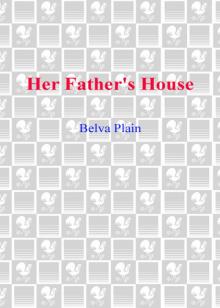 Her Father's House
Her Father's House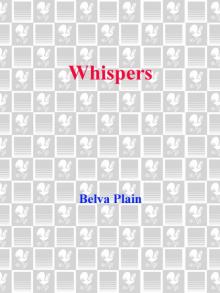 Whispers
Whispers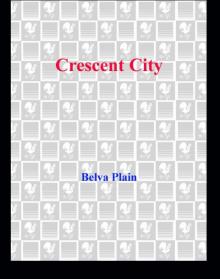 Crescent City
Crescent City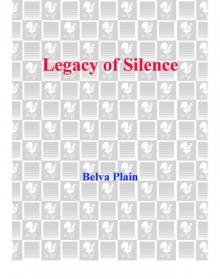 Legacy of Silence
Legacy of Silence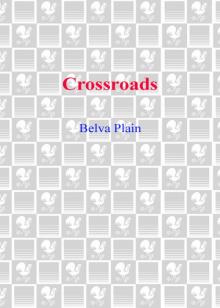 Crossroads
Crossroads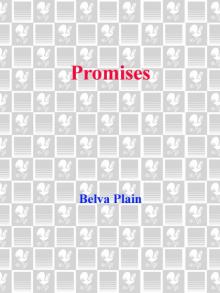 Promises
Promises After the Fire
After the Fire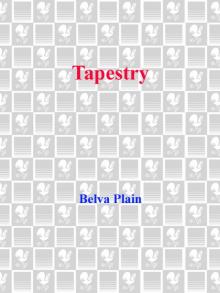 Tapestry
Tapestry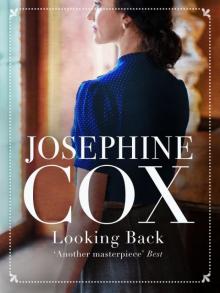 Looking Back
Looking Back Heartwood
Heartwood The Carousel
The Carousel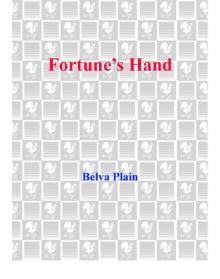 Fortune's Hand
Fortune's Hand Homecoming
Homecoming Random Winds
Random Winds Harvest
Harvest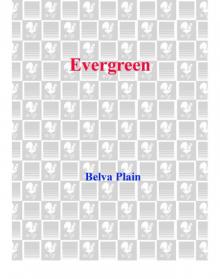 Evergreen
Evergreen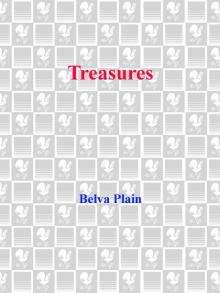 Treasures
Treasures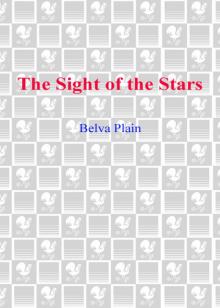 The Sight of the Stars
The Sight of the Stars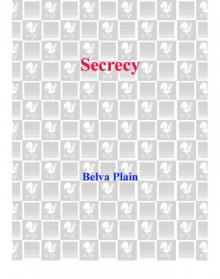 Secrecy
Secrecy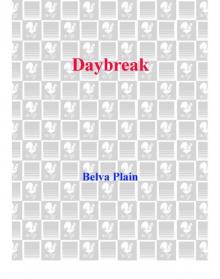 Daybreak
Daybreak Eden Burning
Eden Burning